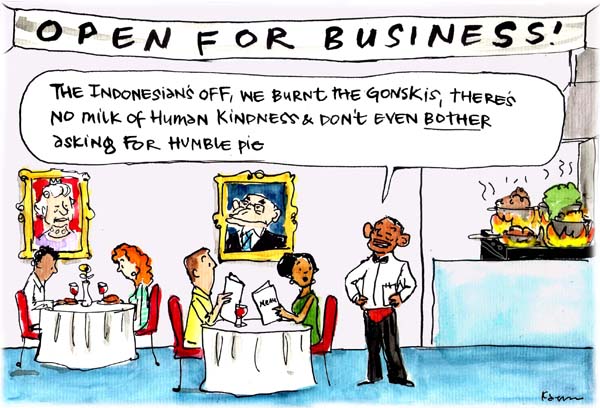Search
Democracy Links
Member's Off-site Blogs
what good cause is that .....

Tony Abbott is a Rhodes Scholar and an Oxford graduate.
Malcolm Fraser, while not a Rhodes scholar, is also an Oxford graduate. Fraser is constantly labouring towards intellectual positions. Whether or not you agree with them, you would be hard-pressed to prove Fraser’s positions are not thoroughly considered. By contrast, Abbott’s utterances on the big issues seem best summed up by his statement, ‘‘No one is the suppository of all wisdom’’.
Abbott spent three years in a seminary studying to be a priest, during which time he must have read theology. Asked recently to reconcile his asylum-seeker program with his Catholic beliefs, he said: ‘‘Jesus knew that there was a place for everything, and it is not necessarily everyone’s place to come to Australia’’. Either he seriously believes Jesus numbered border security among his concerns or it was a glib utterance to get a questioner off his back.
There was also his recent association of the word ‘‘honour’’ with the Imperial Japanese Army during World War 2. More than 2500 Australians died on the Burma Railway basically because, having surrendered, they were seen by the Imperial Japanese Army as being without honour. The kindest interpretation you can give Abbott’s remark is that he didn’t know what he was talking about. Then, this week, he said World War 1 was ‘‘in one sense a tragic waste but it was for a good cause’’.
The Independent newspaper in England has throughout this year run an outstanding series about World War 1. Every few days it publishes a small piece of writing, often a fragment of a letter or a diary written by someone who was involved at the time, who bore the human cost. The most moving of them for me was by Helen Thomas, the wife of poet Edward Thomas.
Thomas was a moody, tortured soul and, by all accounts, he could be cruelly unfeeling towards his wife. Nonetheless, he was the great love of her life. They met in Bohemian London and she was pregnant with their first child before they wed. Edward Thomas is now recognised as one of the great poets of his epoch. Back then, he was hardly recognised at all. He was a professional writer pumping out books on rural England and writing reviews.
Thomas, who found his voice as a poet only near the end of his life, was an intimate friend of American poet Robert Frost. Once, on a walk through the countryside, they encountered a belligerent man. Frost stood up to the aggressor; Thomas was haunted by his failure to do so. In 1915, Thomas interpreted Frost’s poem The Road Not Taken as a message to enlist in the British Army.
The Independent published Helen Thomas’ account of the last two days of her husband’s final leave before going to the front. They both know he is doomed. They do the things they have always done, with one another, with their children, knowing each experience is the last. They are the living, walking dead. Blindly they stumble towards a final act of intimacy.
Helen Thomas’ sense of anguish and foreboding transcends time. Edward Thomas was killed three months after reaching the front. Helen Thomas lived another 50 years, overwhelmed by her loss. Their story would echo with the families of the 62,000 young Australians who died in World War 1 and the 155,000 horribly injured. These casualties were sustained by an Australian population that was about what Melbourne’s population is now.
And that is my question for Tony Abbott: what was the ‘‘good cause’’ that 16 million people died for in World War 1? Please give a serious answer, or risk being seen as Australia’s George W. Bush.
Is Tony Abbott our very own George W. Bush?
- By John Richardson at 9 Aug 2014 - 9:19am
- John Richardson's blog
- Login or register to post comments
Recent comments
8 min 39 sec ago
1 hour 19 min ago
1 hour 28 min ago
3 hours 44 min ago
4 hours 52 min ago
15 hours 8 min ago
19 hours 28 min ago
1 day 49 min ago
1 day 2 hours ago
1 day 4 hours ago